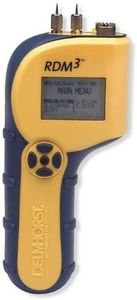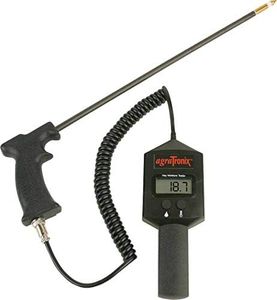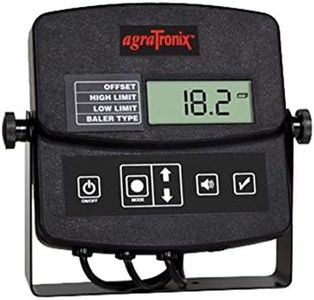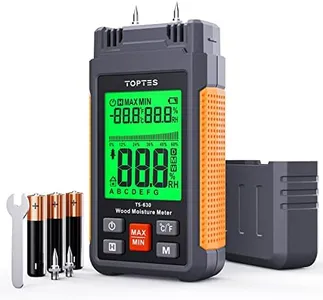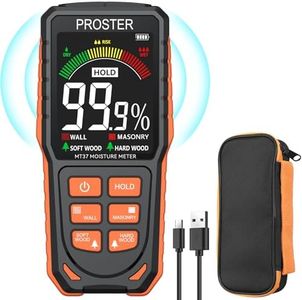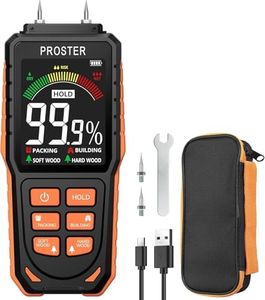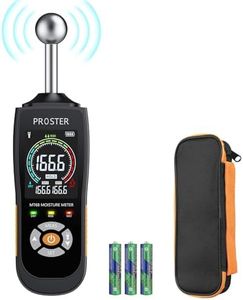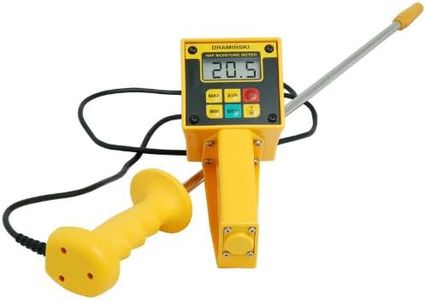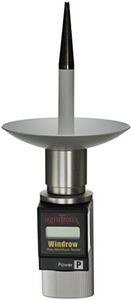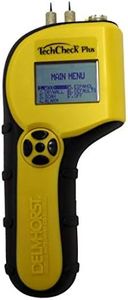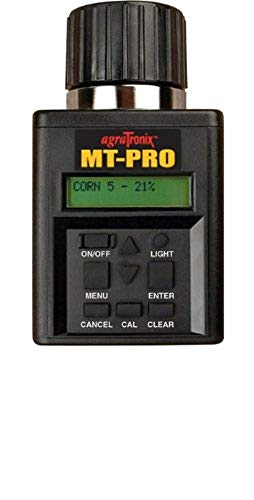10 Best Hay Moisture Testers 2026 in the United States
Our technology thoroughly searches through the online shopping world, reviewing hundreds of sites. We then process and analyze this information, updating in real-time to bring you the latest top-rated products. This way, you always get the best and most current options available.

Our Top Picks
Winner
Delmhorst RDM3 Advanced Rdm-3 Moisture Meter, Basic Package
The Delmhorst RDM3 Moisture Meter is a solid choice for checking moisture levels in hay and other agricultural materials. It uses pin-type measurements, which provide a direct and reliable moisture reading by physically penetrating the material. The digital display makes it easy to read results, and the built-in alarm can alert users when moisture reaches critical levels, helping to prevent spoilage.
It also features data logging, allowing you to keep track of moisture over time, which is helpful when monitoring multiple samples or batches. The meter runs on a standard 9-volt battery, which is convenient and included with the package. It can handle temperatures up to 100°C, making it durable enough for most farm environments.
This user-friendly device includes important features like temperature compensation and data logging, making it well-suited for farmers or professionals who want a dependable tool without complicated setup.
AgraTronix 07100, DHT-1 Portable Hay Moisture Meter with 18" Probe
Most important from
75 reviews
The AgraTronix 07100 DHT-1 Portable Hay Moisture Meter is a robust choice for anyone needing to monitor hay moisture effectively. Its key strength lies in the direct readout feature, which provides immediate moisture and temperature readings, facilitating quick decisions. With its 18-inch probe, it offers adequate reach into hay bales, making it ideal for farmers or agricultural workers.
The backlit LCD display is a thoughtful addition, allowing for operation even in low-light conditions. This is especially useful during early morning or late evening work hours. The sturdy pistol-grip handle adds to the device's usability, providing comfort during prolonged use.
Although it's lightweight at 2.3 pounds, its larger dimensions might make it less portable than some other models. Its durability is implied through the use of aluminum material. The device operates on a 9-volt DC power source but lacks included batteries, so users need to purchase them separately. This meter is a practical tool for general hay moisture testing, particularly for those who value ease of use and straightforward functionality.
Most important from
75 reviews
Agratronix Advanced Hay Straw And Silage Moisture Tester With Durable 20" Probe
Most important from
10 reviews
The Agratronix Advanced Hay Straw and Silage Moisture Tester is a robust tool designed to help farmers and agricultural professionals measure the moisture content in hay, straw bales, and silage accurately. With a moisture measurement range of 8% to 72%, it covers a wide spectrum suitable for various farming needs. The 20-inch stainless steel probe is particularly useful for dense bales, offering durability and ease of handling due to its rubber grip handle. This makes it less likely to suffer damage over long-term use, even under heavy-duty conditions.
The automatic density compensation feature ensures that the readings are adjusted based on the density of the bale, enhancing the accuracy of the results. The bright LCD display is user-friendly, allowing for easy reading both during the day and at night, and supports multiple languages including English, Spanish, French, and Portuguese, making it accessible to a broader range of users. Additional customizable modes for different types of materials (hay, straw, silage) further ensure precise readings tailored to specific needs.
Temperature compensation is another strong point as it can measure temperatures between 14° to 176° Fahrenheit, which is crucial for accurate moisture readings. The tester requires a 9-volt battery, which is not included, potentially adding an extra step for users before they can start using the device. It also has a USB port for saving readings and downloading firmware updates, adding a layer of convenience. This moisture tester is portable, weighing 3.34 pounds, making it easy to carry around the farm. For those in the agricultural sector looking for a reliable and durable moisture tester, this Agratronix model presents itself as a valuable tool.
